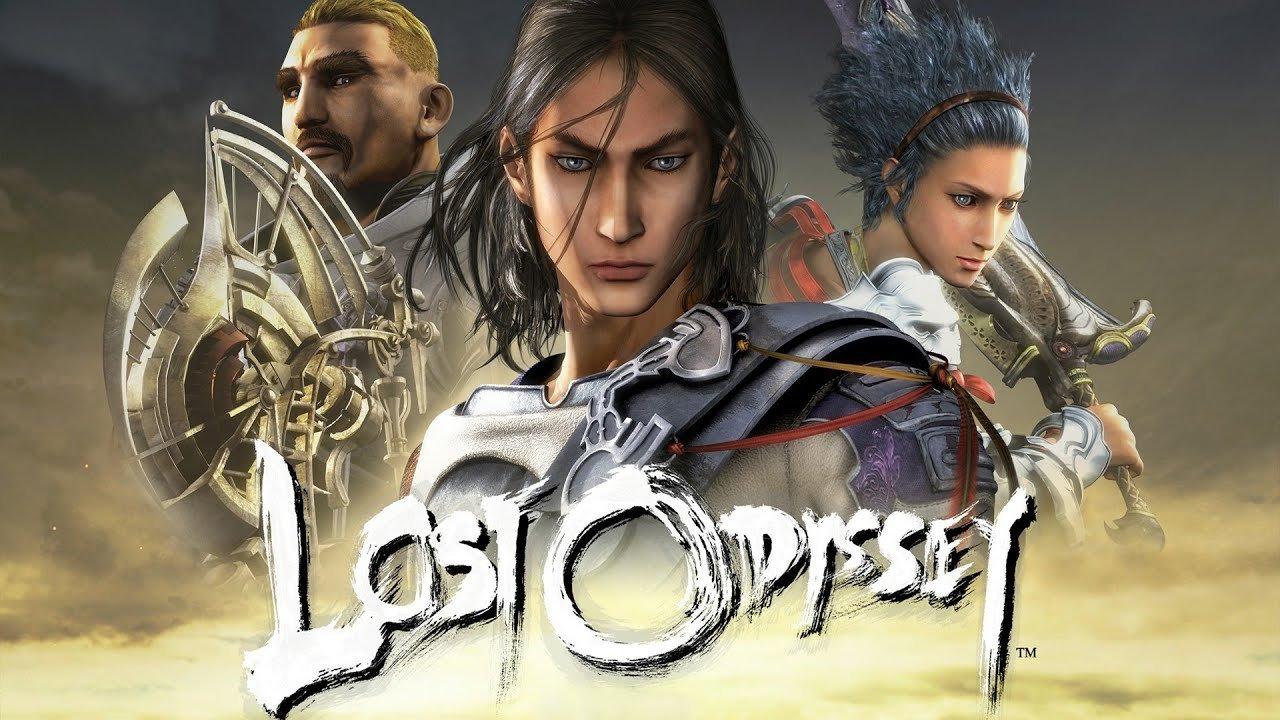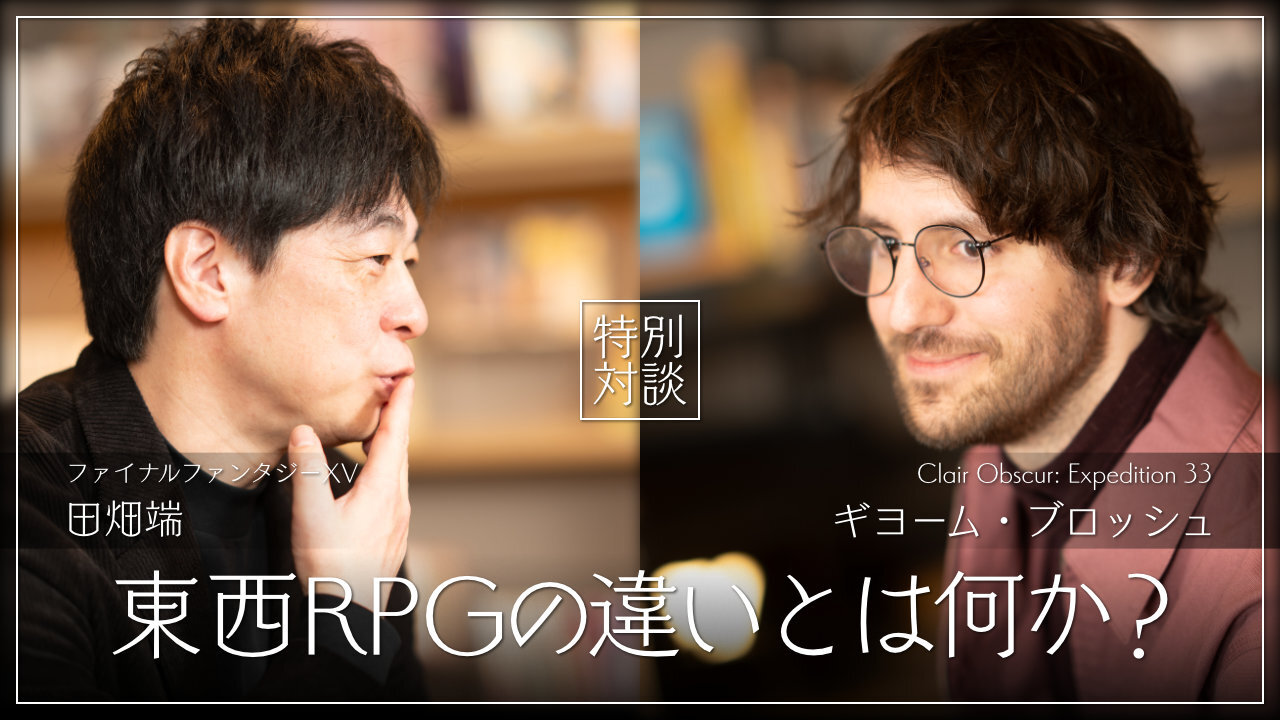--Thank you for joining us today. There are many parts of "Expedition 33" that show respect for JRPGs, but are JRPGs popular in France to begin with?
Guillaume Bloche (hereafter referred to as Guillaume):
Japanese manga and anime are very popular in France. In particular, a lot of Japanese anime was broadcast on television from the 1990s to the 2000s. I grew up in that era, and as a video game fan, I naturally became interested in JRPGs.
However, looking at France as a whole, I don't think JRPGs are particularly noticed there.
Hajime Tabata (hereinafter referred to as Tabata):
So it was a perfect match for Guillaume's tastes?
Guillaume:
I think so. Actually, my first home video game console was the original PlayStation, and the first game I played
was Final Fantasy VIII (FF8).
I learned how to play video games and the language through FF8. I was bad at games at the time, and I couldn't beat the boss and couldn't get ahead at all (laughs).
After that, I started playing the FF series and grew to love it.
Guillaume:
What I like about the FF series is, first of all, the grandeur of the worldview. The scale of the story is huge. Also, each character is well-crafted and has a unique personality, so
I end up liking them more and more every time I play.
Furthermore, each work in the FF series has a completely different worldview, so I think one of the attractions is that you can experience something new every time. It's because of all of this that I've come to really love FF.
Of course, the game system itself is interesting, including the turn-based battles, and the music is wonderful. Everything is in harmony, and the sense of unity is irresistible. I
worship Nobuo Uematsu 's music .
Tabata:
What other games did you play besides FF?
Guillaume:
"Suikoden" ,
"Atelier" series,
"Shadow Hearts" ,
"Persona" series,
"Legend of Dragoon" ,
"Shin Megami Tensei" ... I've played every Japanese game (laughs). I've been playing JRPGs since I was a child, so when I bought new games, I naturally only chose JRPGs.
Tabata:
I see, that makes sense. I just watched the gameplay, and it seems like it has a lot of JRPG genes, not just Final Fantasy (laughs).
Guillaume:
Yes, I think all of my experiences have been packed into this work.
--In the early 2000s, JRPGs were sometimes perceived negatively. However, in recent years, they have been reevaluated and are now accepted as a positive and attractive genre. What do you think about this transition?
Tabata:
That was certainly the case. I would like to know what France was like at that time and what Guillaume was thinking.
Guillaume:
Even in France, the early to late 2000swas
a time when JRPGs were very harshly received . For example, Lost Odyssey was very harshly received in Europe at the time, and I think it was a time when the JRPG genre itself was poorly received. Due to this influence, the number of new JRPGs released also decreased.
"Either I die or the witch perishes. It's a 0 or 100 death match!" Senahara Athha, a self-proclaimed genius gambler. She challenges the "Witch" who rules the gambling zone, but is defeated by a mysterious power just before she can win... A gambling adventure in which you expose cheating and rise to the top in poker.
Resist the madness and evil. Unreasonable urban action "Tribe Nine" | Set in the country of Neo Tokyo, boys and girls fight to regain their lost freedom and dreams, and engage in a brutal battle with death at their doorstep.
actionRPGFree Play
Release date: February 19, 2025
Steam store page

* Lost Odyssey: An RPG for Xbox 360 released by Microsoft in 2007. Produced by Hironobu Sakaguchi, with participation from a stellar lineup including Nobuo Uematsu, Takehiko Inoue, and Kiyoshi Shigematsu. Set in a world where an industrial revolution has occurred due to the discovery of an unknown energy called "magic power," the story depicts the battle of an immortal man who takes on the intensifying war.
I've always loved JRPGs, and I thought Lost Odyssey was a really great game, so I was really stressed by those reviews. However, there were fewer new JRPGs, so I may have spent more time playing fighting games like
Guilty Gear at the time.
However, as times change, my respect for and values towards JRPGs have not wavered at all... At my core, I have always loved JRPGs, and I think that feeling is
reflected in "Expedition 33."
--How do you two analyze the differences between RPGs made in Japan and those made overseas?
Tabata:
For example, in Japanese RPGs, enemies need a reason to fight. I think that's a very Japanese element at its root. In Japanese content culture, that kind of thing is very important.
Also, in Japanese RPGs, it's common for characters who were originally enemies to join forces when they face a new strong enemy. This is a plot that can also be seen in manga and anime, but I
think the characteristic of Japanese RPGs is that you save the world together with your friends while experiencing such Japanese values.
Japanese entertainment works, even those aimed at children, have a proper "enemy," but
in the end, the final boss has a change of heart (laughs). I think this kind of plot development is a very Japanese characteristic.
I feel that in the past, RPGs that strongly reflect Japanese values like these were seen in the West as being a bit childish, or "Japanese RPGs."
On the other hand, in recent years, a lot of Japanese content has spread around the world and Japanese values have come to be highly regarded, so I believe that the image of the term JRPG has changed significantly.
Guillaume:
In Europe,I think it's more common for
the ending to be a gruesome one, with all the enemies dying (laughs).
Tabata:
That's right. I really feel the difference.
In terms of Japanese RPGs, I think the element of "growth" is also important. The protagonist is weak and unable to accomplish anything at first, but grows through adventures with his companions and achieves a big goal at the end. This flow is also very Japanese.
Guillaume:
There's a common Western joke that goes,
"In Japanese games, you start off by defeating rats, but in the end you end up defeating God .
Tabata:
That's right. In order to grow and save the world, it's important that you fight to the death even against rats at first (laughs).


